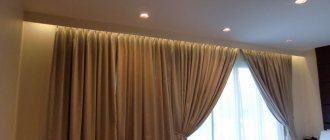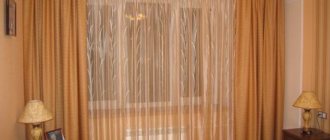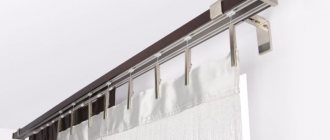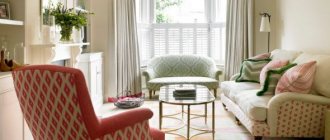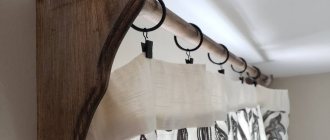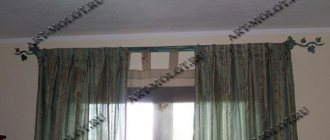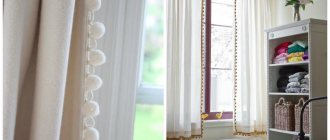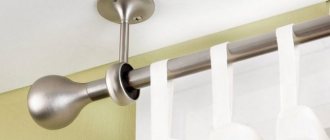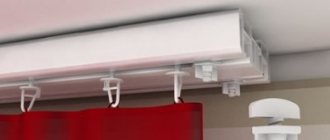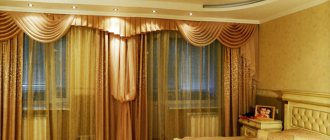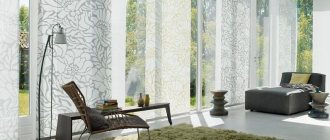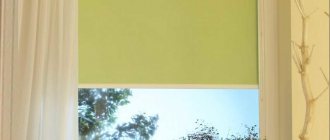Window curtains are an integral part of the interior of a modern apartment. They carry both aesthetic and practical significance, protecting the room from bright light and prying eyes. To securely fasten the curtains you need to install a curtain rod. Let's try to figure out how they work and what they are like in this article.
Attaching curtains to the ceiling gives a lot of scope for design ideas
Ceiling cornices: functional differences
Functionally they are divided into:
- single-row;
- double row;
- three-row.
Single-row is designed to secure one type of fabric and fits well with a particular interior style.
A single-row curtain rod has only one track for attaching curtains
The double-row is the most common; it is used to fasten in two rows, which makes the window opening more saturated.
A double-row cornice allows you to decorate windows not only with thin fabric, but also with thicker night curtains
With the help of a three-row, exclusive design ideas are realized in creating an interior on the windows.
Three-row and wider products are used for complex compositions, for example, for Japanese curtains
Required Tools
With plain decorative overlay
Installing any: three-row, two-row or single-row is quite simple. First of all, everything needs to be correctly calculated and laid out. This is usually done at the stage of planning and preparation of upcoming work.
All you need next is:
- selected model;
- drill;
- 2 drills of different diameters;
- fasteners;
- knife or file (you can use a jigsaw)
- pencil, square and tape measure.
In what cases is it better to choose a ceiling mount?
The following options exist:
- panoramic windows need to be curtained;
- to achieve the visual effect of greater room height using long curtains;
- the presence of minor defects in the apartment;
- the end of the window opening is located close to the ceiling, there is no space for installation;
- the walls are made of material that does not allow the bracket to be firmly fixed;
- to limit the access of cold air - the arched shape will provide good insulation;
- draw more attention to the canvas and hide the profile behind a decorative strip.
Using ceiling mounted curtains you can visually increase the height of the room
Hiding a wall behind solid curtains is perhaps the easiest way to hide defects in a window opening
Features of installing cornices on a suspended or suspended ceiling
Neither suspended nor suspended ceilings are able to hold at least some mass. Therefore, hanging a curtain rod on a suspended/stretch ceiling “directly” will not work. There are two options:
- When installing the ceiling, install the mortgages (usually wooden blocks) to which the holders are screwed. In this case, the load, through the mortgages, is transferred to the main ceiling (floor). When attaching to wooden blocks, the fasteners are self-tapping screws. The length is less than the height of the beam.
Mortgages under suspended ceilings
Both options are working. Only in the second case is there a hidden cornice that is not visible. There are only curtains and curtains. The cornice (blind, curtain) is not visible.
When installing mortgages, you can fix the block parallel to the wall. In this case, the installation will be similar, but a whole beam under the cornice is wasteful. You can install small sections - 30-50 centimeters long in the places where the cornice is supposed to be attached. Installation will become more difficult - you will have to take into account the position of the mortgages, but this is nothing. If timber is expensive, savings are more important.
If you need to lower it lower
If the ceiling is lowered not by 5-7 cm, but by a greater distance, several bars should not be attached. In this case, metal brackets are screwed to the base (base floor), and a small piece of timber or thick plywood is screwed to them. The lower edge of the block/plywood should be set at the level of the suspended/suspended ceiling.
In the case of a plasterboard ceiling, you can use a profile as a mortgage, which is screwed “backwards” down. In this case, you will need to use metal screws. Most likely, before hanging the curtain rod, you will have to drill holes with a small drill, otherwise the self-tapping screw may not work. It will not be possible to develop a large force, since the suspensions will bend.
Fastening device
It is important to consider that the product is mounted either on the original ceiling surface or on a previously fixed beam, or on platforms. Today there are two methods of fastening:
- An open type method in which hidden supports are first installed, and then fixation systems are installed.
- Closed type method - installation is carried out on the original ceiling, where the cornice is mounted behind the flooring.
The first method is the simplest and most common. The second method requires certain skills, but the result is worth the candle.
Many wall cornices can be mounted on the ceiling if the design of the brackets allows
Materials for production
In order to make a competent choice from the wide range of products on the market, you must rely on two main conditions:
- Compliance with the stylistic features of the interior.
- The material from which it is made must have good practicality and wear resistance characteristics.
Cornices with a smooth surface are suitable for modern room decoration styles.
Classic interior trends require more elaborate design
A cornice with an imitation of a roughly processed surface would be appropriate in a loft or rustic style
Profiles can be made of metal or plastic. Plastic products have recently been noticeably crowding out their metal counterparts. They can boast of their low price, have a wide selection of colors, as well as many texture options, which allows you to implement more design solutions.
Plastic profile systems allow you to create various combinations, and components are sold separately
The metal analogue is made of black chrome or stainless steel, on a nickel, bronze, brass base, as well as aluminum. They are in a more expensive price segment, unlike their plastic counterparts, but the high price is compensated by their long service life and chic appearance, suitable for almost any interior.
Metal cornices are the most reliable in design, however, the permissible load on them also depends on the ceiling material
Double-row ceiling cornice with round rods
Problems of choice
Ceiling surfaces and recommended curtains
According to the methods of designing the ceiling space, it is usually divided into several types:
- reinforced concrete ceilings;
- tension systems;
- rack structures;
- suspended and mirror surfaces;
- false ceilings;
- raster or cassette coverings.
When choosing ceiling curtains, be sure to take into account the type of ceiling in the room. If you have reinforced concrete foundations that are standard for apartments, installing a cornice of any weight to the ceiling will not be difficult.
But with tension or suspended plasterboard structures the situation is different. You will have to focus not only on the fasteners that come with the curtain rod, but also on the types of ceiling materials, because the curtain is attached not to the wall, but to the ceiling above the window
Types of designs and materials
Ceiling curtains help out when the window sill protrudes significantly into the room.
According to the type of material from which the cornice can be made, the following types of products are distinguished:
- string curtains fit light curtains. Their design is represented by a string stretched between two fasteners. Under the weight of the textile, the cornice will begin to sag. Therefore, a hanging string curtain is suitable for a kitchen with a weightless curtain or a children's room.
- wooden cornices will highlight styles such as Provence, classic, country, and rustic. The main advantages are the environmental friendliness of the material and the ability to withstand maximum loads.
- profile systems are simple and democratic. However, it is with them that most design ideas can be solved. The design of the curtain is represented by a long aluminum or plastic profile with several rows. This feature allows you to hang tulle, curtains on one product and complement the design with lambrequins.
The profile is equipped with elements that round corners and connect its individual parts.
- metal curtain rods are the most durable and can easily withstand multi-layer compositions and heavy printed curtains. This is an excellent solution for high-tech and minimalist styles.
Dimensions
When choosing curtain rods, the question always arises as to what size the curtains should be. If we talk about optimal parameters, then for a spacious room in which the windows are located along a long wall, you need to purchase curtains 50-60 cm wider than the window opening. It is necessary to cover a section of the wall surface to prevent oblique sun rays from entering the room.
For a narrow room, the dimensions of the cornice should be slightly narrower than the window wall.
Plastic curtain rods, description, pros and cons
- Weight. There are designs for light, medium and heavy curtains. This takes into account the weight of the canvas and the presence of related components.
- Varieties. It can be attached to the ceiling or wall, and has a universal mount.
- Tire profile. They have a hollow structure or with filling. In the first case, the design turns out to be very light, but the fabric is also lightweight. The filled profile holds heavier curtains, is rigid and has a more pronounced relief.
- Control type. There is either an electric drive or it can be opened and closed manually. Electric drives are becoming increasingly popular, while being inexpensive.
Straight cornice
Cornice with a turn
Cornice with baguette
Flexible cornice
Note! Provided that modern curtain rods for heavy curtains made of plastic, on which heavy structures are attached, are strong enough, it is recommended to use a combined product with a metal base that has increased strength.
Inexpensive plastic models without decorative cladding are often used to secure curtains in niches where the design of the cornice does not matter.
Below in the table we consider the positive and negative aspects of plastic products:
| pros | Minuses |
| They have a lower price compared to metal counterparts. | They look less stylish compared to metal products. |
| Easy installation and maintainability. | They have low strength compared to metal and wooden counterparts. |
| Durability and reliability. | |
| Versatility. The structures are used in rooms with any climatic conditions. The material does not accumulate moisture, does not rust, does not ignite, and does not conduct electricity. | |
| Harmonizes with any type of interior. | |
| Made from environmentally friendly material, suitable for use in children's institutions. Minimal risk of allergic reactions in children. | |
| Easy to care for. |
How to choose a cornice for tulle
If the curtain is made of tulle, you can choose metal, string, plastic, or bus curtain rod systems. For light and translucent fabrics, string and thin metal rod guides are used. The mounting option can be any: ceiling or wall.
Cornices are a full-fledged element of the interior that performs an aesthetic function and carries a load. It can be used as an interesting accent, a highlight. Even this small element contributes to the atmosphere of the room. Manufacturers offer a wide range of models, including designer ones.
Cornices for ceiling curtains Source optolov.ru
Cornice with decorative element Source kupinatao.com
Tulle for an interior in a minimalist style Source www.d-interior.sk
Those who prefer original non-standard solutions can choose products created using innovative technologies using new methods of processing bronze, wood, brass, steel, nickel, and forged iron. Cornices are inlaid with non-ferrous metals, precious woods, Venetian glass, natural stone, porcelain, crystal, decorated with mother-of-pearl, leather and other materials.
Aluminum curtain rods for ceilings. Description, advantages and disadvantages
Aluminum structures are very light and durable, which gives them an advantage over their wood and plastic counterparts.
Aluminum cornices are lightweight and easy to handle if necessary
There are the following types of aluminum profiles:
- in the shape of a round rod;
- tire, with special hooks;
- string type.
In the first version, the suspension has the shape of rings or loops. The profile has a standard outline and does not differ from curtains.
The tire differs from the bar in its shape, inside of which the loops for fastening move. It is attached to the ceiling and can be used not only when decorating window openings. With its help, they divide the room into separate zones.
Most models of profile aluminum curtain rods can be considered universal, since they can be installed on both the ceiling and the wall
String-type analogues have become very widespread; they are attached to the ceiling, but are included in a separate group.
The table discusses the advantages and disadvantages of aluminum products:
| pros | Minuses |
| They are light in weight. | Higher price. |
| Easy to install. | you need to purchase additional components. |
| Variety of models. | |
| High wear resistance | |
| Possibility to divide the room into separate zones. |
Tips for installing round curtains with your own hands
It is important to install the product correctly. Violation of this point will lead to uneven placement of the curtains.
Professionals advise you to take into account several points if you plan to decorate the ceiling with a round cornice:
- On round curtain rods, during installation, install one ring between the retaining bracket and the end of the curtain. The curtains will be fixed in the extreme position.
- Place the rings at a distance of 10-15 cm, then the folds on the curtains will be even.
- If the curtain comes with additional clothespins, alternate them with rings.
Examples and photos in the interior
This chapter presents photos of ceiling curtains for curtains suitable for various living rooms. Today, there are a great variety of products for fastening curtains made from various materials on the market. Implementing any design solution when decorating window openings is not particularly difficult. However, many nuances should be taken into account both when choosing a product and when installing a cornice, so as not to make gross mistakes and achieve a good result.
What is the difference between one-, two- and three-row designs
Decorative tips on forged products. A true work of art
The principles for installing single-row or double-row ceiling cornices in such cases do not differ from each other. The number of rows depends on the number and weight of the curtains.
They came up with the idea of installing several rows so that you could easily hang curtains designed for different times of the day and control the level of lighting in the room. Also, such designs are used to create artistic decorations for draperies, when they hang in several rows in beautiful folds.
Thanks to this design, the weight of the curtains and curtains is distributed evenly along the entire length. To make it easy to open and move the curtains, they are attached to special runners. To learn how to install a cornice with your own hands, watch the video.
Installation errors
Elegant, Baroque style. A real decoration for any palace, or simply a room stylized as one
Errors are inevitable during installation work. In the absence of experience, it is difficult to perform all actions according to the instructions.
Below are the most common mistakes made during selection and installation:
- Weight discrepancy. When choosing a cornice, you should consider in advance what curtains will hang on it. Underestimating this factor can lead to it simply bursting and the entire structure falling along with the fastenings to the floor.
- You need to start fastening the structure from the edge. Installation must be carried out from the middle so that it is installed as parallel to the window as possible.
- Failure to maintain distance from the window. Too close or too far from the window. If you place the structure far from the window, this can ruin the view, especially if the cornice is not installed across the entire width of the room. Too close a location makes it difficult to open the windows normally. The curtain fabric often adheres to the radiator or window sill, becomes deformed, wrinkles, and unsightly folds appear.
